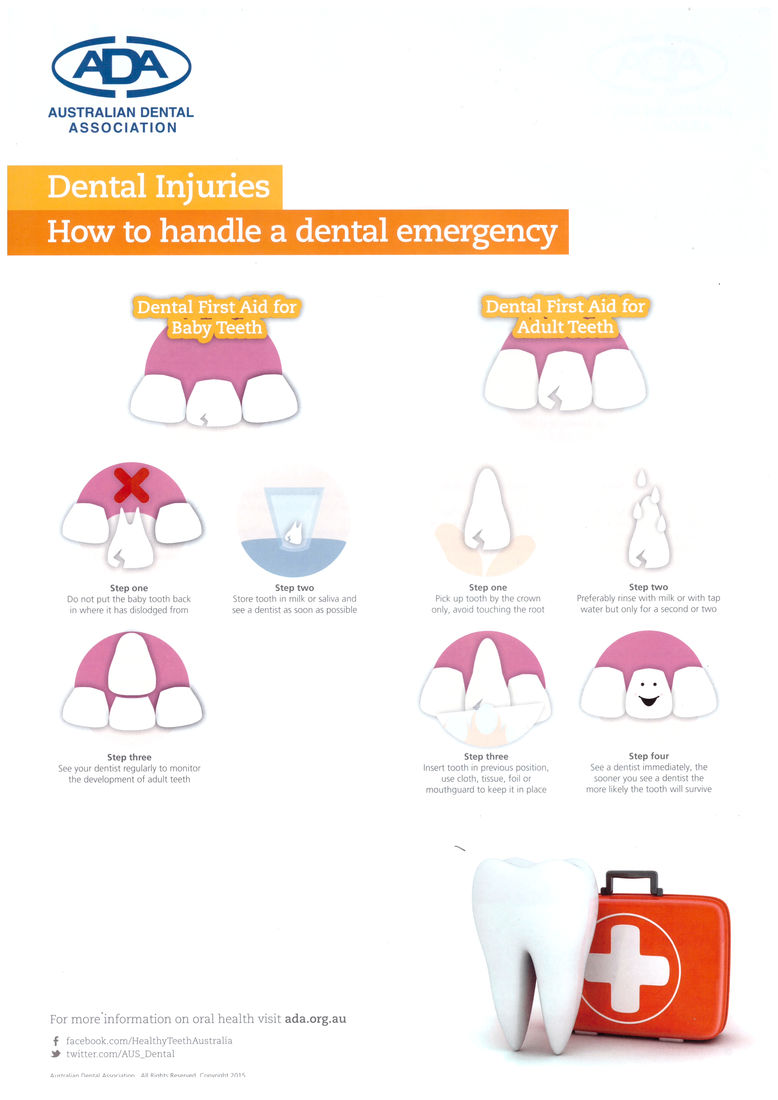Bookmark Our Page By Adding Our Website To Your Home Screen
Shop 20, 165-191 Macquarie Street
Liverpool, NSW 2170
(02) 9822 5590
(02) 9822 5591
Monday - Friday
9am-5pm
Saturday: By appointments only
Shop 20, 165-191 Macquarie Street,
Liverpool, NSW 2170
(02) 9822 5590
(02) 9822 5591
Monday – Friday
9am-5pm
Saturday: By appointments only
HOW TO HANDLE A DENTAL EMERGENCY
Accidents can happen to anybody at any age, but knowing what to do when a dental injury occurs is critical.
If your teeth or mouth get knocked and you can't see any damage....don't assume everthing will be okay. Play it safe and book an appointment with your dentist as soon as you can.
Dental First Aid
Baby (Primary) Teeth
Babies and toddlers who have just started crawling or walking are prone to hurting themselves. Bumps, knocks and spills are all a part of growing up, but long lasting damage can occur if your child's teeth are injured and left untreated. Knowing how to adminster dental firs aid could save a child from long-lasting damage.
Step 1: If a child knocks out a baby tooth do not attempt to put it back in.
Step 2: Seek an immediate dental examination, because dentists are best qualified to assess the damage and recommend the correct course of action. Take the knocked out tooth with you, so your dentist can ensure that the entire tooth has been knocked out and not just a part of the tooth. If you are unsure whether the tooth is an adult tooth or a 'baby' tooth, store it in milk or saliva (as described below) and visit your dentist ASAP.
Step 3: Attend regular dental check-ups so your dentist can monitor how the adult teeth are develoing.
Adult (Secondary) Teeth
If you or someone you know has a tooth (or teeth) knocked out it's important to remain calm and act quickly.
Step 1: Locate the tooth as quickly as possible and pick it up by its crown. Handle with care-avoid touching the 'root' of the tooth!
Step 2: If dirty, rinse the tooth with some milk, of if milk is not available rinse using tap water but only for a second or two. Do not scrub or soak the tooth.
Step 3: Insert the tooth back into its previous position in the mouth, making sure it is the right way around and in the right place. Compare it to the surrounding teeth to make sure you've got it right. Once it's in, gently bite down on a clean piece of soft cloth ot tissue to help keep the tooth in place. If it is 'wobbly', then folding a small piece of aluminium foil over the area can help keep the tooth in place, or if you have your mouthguard on hand, put it back into your mouth to stabilise the traumatized tooth.
Do not wrap the tooth in tissue or cloth as this will dry out the tooth.
Step 4: See a dentist IMMEDIATELY, ideallly within 30 minutes. The sooner the tooth is replaced, the greater the likelihood it will survive. Many dental practices or dental hospitals are open for emergencies and often have after hours care and contact details on their website or answering machine.
Cracked, Chipped and Broken Teeth
Teeth can be cracked, chipped or become loose from accidents, and impact injuries can cause long term damage if not quickly assessed and treated by a dentist.
If you chip your tooth, even slightly, always book an appointment to see your dentist and be sure to inform them over the phone that you've had an accident so they can see you as soon as possible. Try to collect any tooth fragments and transport them in milk to your dentist. If possible, your dentist may re-attach the fractured fragments to the broken tooth.
Just because you can't see any damage doesn't mean it's not there. A knock to the tooth or mouth can cause 'cracks' in the teeth or their roots that will not be visible to the naked eye and will require an assessment by a dentist. If left unchecked, the damage caused by an injury can significantly increase the risk of infection, decay, and loss of the tooth.
TIPS AT A GLANCE
